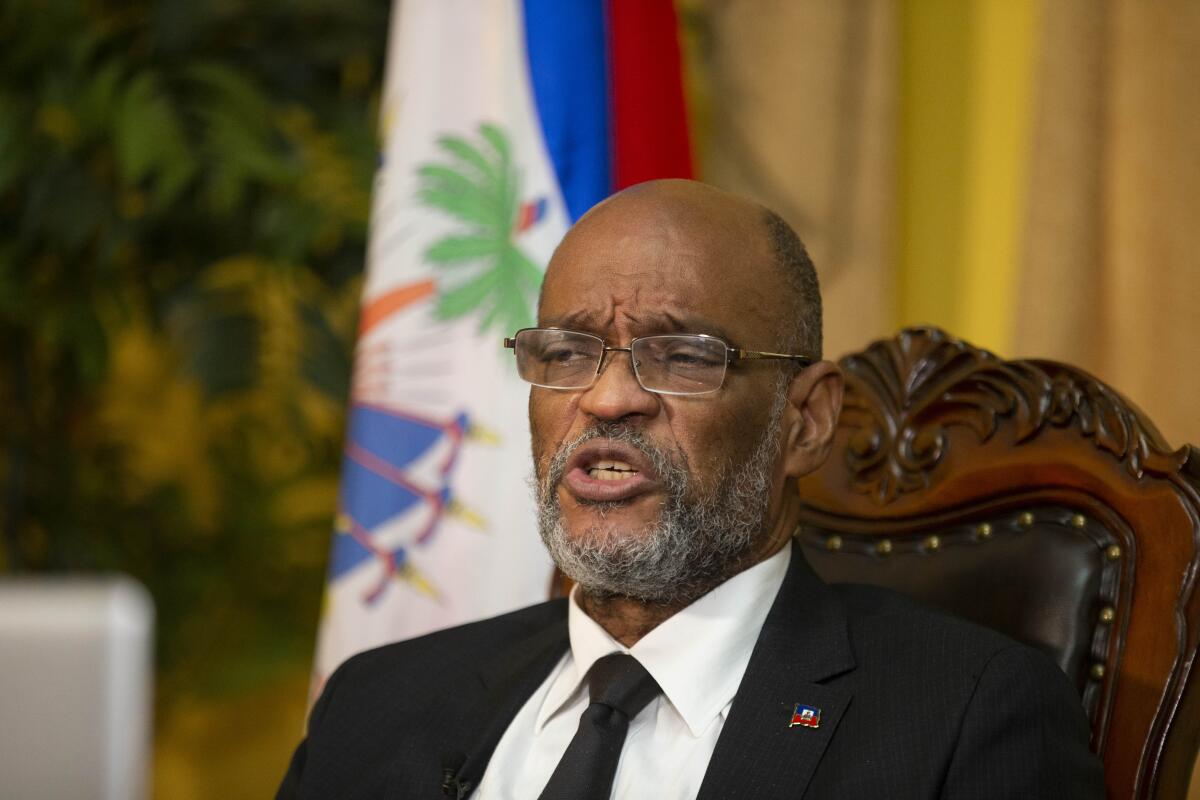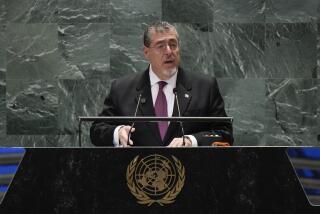U.S. to pull visas of Haitian officials, send assistance

- Share via
SAN JUAN, Puerto Rico — The U.S. government will pull visas belonging to current and former Haitian government officials involved with criminal organizations as well as provide security and humanitarian assistance to Haiti, senior U.S. officials said Wednesday.
The officials spoke to reporters by telephone on condition of anonymity as a U.S. delegation was arriving in the Caribbean country that has been paralyzed by gangs and antigovernment protests and is facing severe shortages of water, fuel and other basic supplies.
Meanwhile, Secretary of State Antony J. Blinken said in a statement Wednesday that the U.S. will increase “security assistance” to Haiti’s national police “to strengthen their capacity to counter gangs and reestablish a stable security environment.”
The U.S. officials who briefed reporters declined to name which Haitian officials would see their visas revoked or how many would be affected, adding only that the measure also applies to their immediate family members.
The U.S. officials also said the government is working with Mexico on a United Nations resolution proposing specific sanctions and additional measures to address the many challenges Haiti faces.
The officials declined to say how the upcoming aid would be distributed, although they noted that the U.S. Coast Guard will deploy a major cutter at the request of local officials. They also declined to say when, how and what kind of security and humanitarian assistance will be deployed. Supplies such as bleach, water jugs and oral rehydration salts will be distributed as the nation battles a cholera outbreak, they added.
As of Sunday, authorities in Haiti had reported 18 deaths and more than 260 suspected cases of cholera in Port-au-Prince and surrounding areas.
“Cholera has arrived amid serious ongoing social and political unrest,” said Dr. Carissa Etienne, director of the Pan American Health Organization. The situation complicates “efforts to provide humanitarian assistance and to respond to the outbreak,” she said.
Etienne warned Wednesday that cases are probably significantly higher than what’s being reported because they are concentrated in areas affected by escalating street violence and gang activity.
U.S. Assistant Secretary for Western Hemisphere Affairs Brian Nichols flew to Haiti on Wednesday and was scheduled to meet with politicians and civil society leaders, including Prime Minister Ariel Henry and a prominent group that has pushed to lead a two-year transitional government and rejected Henry’s petition for foreign troops.
Nichols was accompanied by the military deputy commander of the Defense Department’s Southern Command, White House senior advisors and other officials.
The trip comes just days after Henry requested the immediate deployment of foreign troops to help with security. Gangs have blockaded a major fuel depot and protests against him have added to the problems.
“The delegation will assess how the U.S. government can continue to provide various forms of assistance and promote accountability for those responsible for criminal acts,” the State Department said.
Since last year, the U.S. has provided Haiti with more than $170 million in humanitarian assistance and an additional $90 million to strengthen Haiti’s national police. But the department remains understaffed and has limited resources to fight gangs that have grown more powerful since President Jovenel Moise was assassinated in July 2021.
The U.N. Security Council is scheduled to discuss Henry’s request this month. In a letter to the council Sunday, U.N. Secretary-General António Guterres offered several options, including a rapid action force.
It was unclear whether the U.N. or individual countries or both would send troops under such a plan.
On Tuesday, State Department spokesman Ned Price said the U.S. was reviewing Henry’s request with international partners “to determine how we best could contribute to the removal of security constraints on medical and humanitarian measures aimed at halting the spread of cholera.”
One month has passed since one of Haiti’s most powerful gangs surrounded a key fuel terminal in the capital of Port-au-Prince, preventing the distribution of some 10 million gallons of gasoline and diesel and more than 800,000 gallons of kerosene stored on site.
In addition, protesters have blocked streets in the capital and other major cities to demand Henry’s resignation. Prices have soared since the prime minister last month announced that his administration could no longer afford to subsidize fuel.
On Monday, Price said that the U.S. government wants “to be prudent and responsible in terms of what any such action might look like.”
Associated Press writer Gisela Salomón in Miami contributed to this report.
More to Read
Sign up for Essential California
The most important California stories and recommendations in your inbox every morning.
You may occasionally receive promotional content from the Los Angeles Times.










